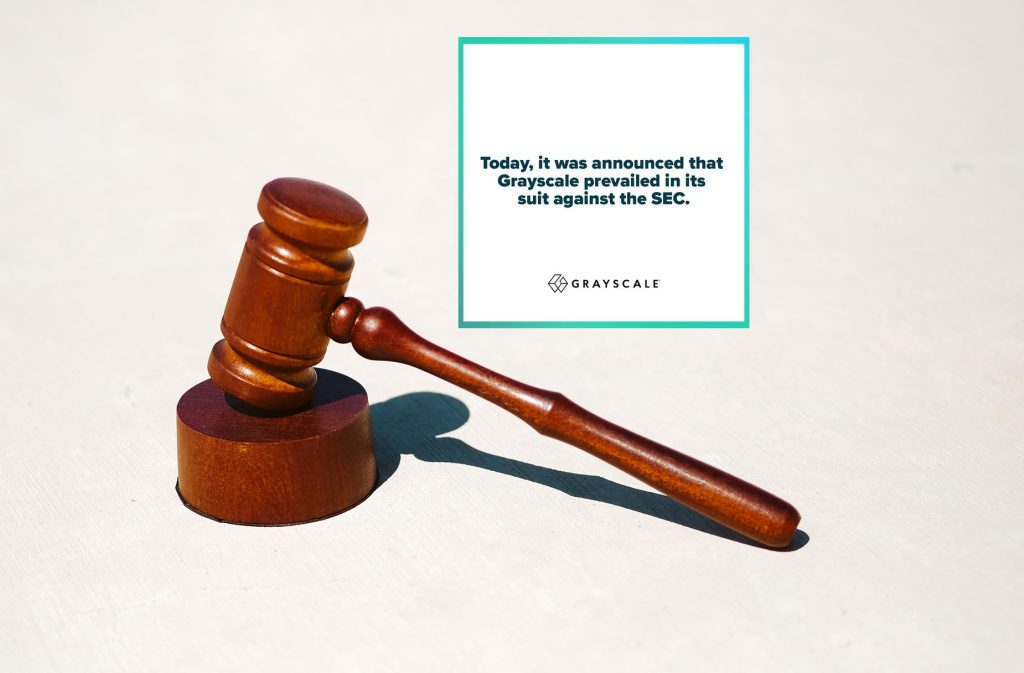
In the world of cryptocurrencies, the turning point will be August 29, 2023, when the appellate court in the District of Columbia overturned the decision of the U.S. Securities and Exchange Commission (SEC). Grayscale Investments LLC achieved a long-anticipated victory in converting its Bitcoin Trust into a Bitcoin spot ETF.
Almost a year ago, on June 29, 2022, the SEC rejected Grayscale’s initial application to convert Bitcoin Trust to Bitcoin spot ETF. Grayscale defended its position, claiming the SEC acted “arbitrarily and capriciously” in rejecting Bitcoin spot ETF applications, especially considering its earlier acceptance of ETFs based on Bitcoin futures contracts. The company accused the SEC of violating the Securities Exchange Act by “unfairly discriminating” against Bitcoin spot ETF issuers.
The market’s reaction was immediate. The value of Bitcoin (BTC) increased by 6% within just an hour after the verdict announcement, although it later pulled back, maintaining a growth of about 5%.
However, the significance of this ruling goes beyond the success of Grayscale alone. As previously reported by CryptoSlate, the court’s decision in this case could determine the future of all spot Bitcoin ETF applications filed this year.
The heart of the dispute lay in the SEC’s differential treatment of spot Bitcoin ETFs and ETFs based on Bitcoin futures contracts. Although both forms present similar risks and are priced based on the same spot markets, the SEC argued that spot Bitcoin ETFs are more susceptible to manipulation and fraud due to the unregulated nature of the underlying spot market. Additionally, according to the SEC, the regulated Chicago Mercantile Exchange, where ETFs based on Bitcoin futures contracts are traded, has adequate safeguards against fraud and manipulation.
Responding to the verdict, Grayscale CEO, Michael Sonnenshein, thanked the company’s investors for their support and encouragement via a tweet. He also noted that Grayscale’s legal team is closely analyzing the court’s opinion.
The court’s decision was crucial for anyone eager to introduce a spot Bitcoin ETF to the U.S. market. Had Grayscale lost, the company could have appealed for a rehearing before the full court in the District of Columbia or appealed to the Supreme Court. With this victory, the future of Bitcoin spot ETF issuers in the U.S. now seems much brighter.
The Grayscale vs. SEC ruling can transform the cryptocurrency landscape in the United States, opening doors for other entities looking to launch a spot Bitcoin ETF. This event underscores the importance and evolution of regulations in the world of digital currencies, and its effects will be felt for years to come.
What is a Spot Bitcoin ETF?
A Spot Bitcoin ETF is an exchange-traded fund (ETF) that directly tracks the “spot” or current price of Bitcoin, rather than relying on derivative instruments such as futures contracts. In practice, this means when an investor buys shares in a spot Bitcoin ETF, the fund purchases physical bitcoins and holds them on behalf of investors.
The difference between a spot Bitcoin ETF and a Bitcoin futures ETF is that the latter is based on Bitcoin futures contracts, which are agreements to buy or sell Bitcoin in the future at a set price, not its current price.
Many consider spot Bitcoin ETF as a more direct way to invest in Bitcoin, as it directly reflects its current market value, whereas a Bitcoin futures ETF may be more exposed to factors related to the futures market, such as contango or backwardation, which can impact the ETF’s value.
Photo by Tingey Injury Law Firm on Unsplash
